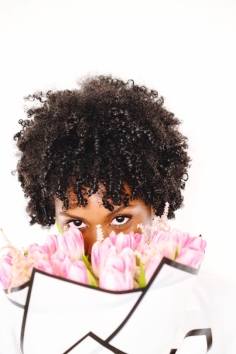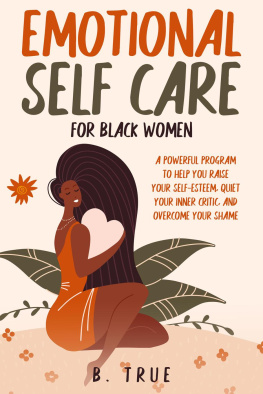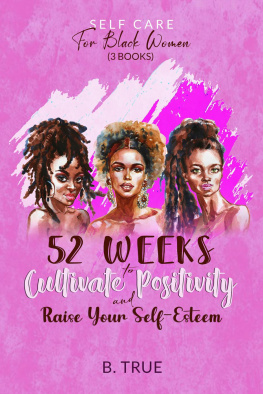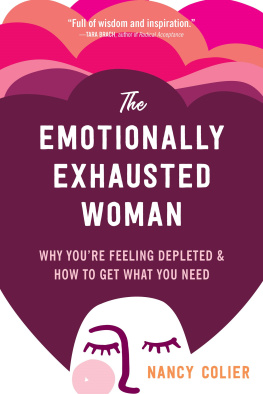Also by B. TRUE
Self-Care for Black Women
Emotional Self Care for Black Women: A Powerful Program to Help You Raise Your Self-Esteem, Quiet Your Inner Critic, and Overcome Your Shame
Spiritual Self Care for Black Women: Practical and Inspiring Ways to Love Yourself More
Black Women's Mental Health: Self-Care for Black Women Who Do Too Much - Love Yourself Deeply
Self-Care for Black Women (3 books): 52 Weeks to Cultivate Positivity & Raise Your Self-Esteem
369 Powerful Affirmations for Black Women: Reprogram Your Subconscious with Subliminal Affirmations and Messages
Assertive Communication for Black Women: NLP Techniques, Non-Verbal Communication, Emotional Intelligence, Exercises and More!
Manifesting For Black Women: 19 Ways to Start Working Toward Your Goals - Law of Attraction, 369 Method and More
E MOTIONAL Self Care
For Black W OMEN

A Powerful Program to Help You Raise Your Self-Esteem, Quiet Your Inner Critic, and Overcome Your Shame
B. TRUE

NO LONGER UNDER LOCK AND KEY
Look inside to understand what your needs are. I'm not talking about vital needs (eating, sleeping) but about what we need to feel good. What do you need to feel good? TO BE HAPPY, REALLY HAPPY? WHAT DO YOU NEED?
Copyright 2021 B. TRUE
All Rights Reserved
This document is geared towards providing exact and reliable information with regards to the topic and issue covered. The publication is sold with the idea that the publisher is not required to render accounting, officially permitted, or otherwise, qualified services. If advice is necessary, legal or professional, a practiced individual in the profession should be ordered.
From a Declaration of Principles which was accepted and approved equally by a Committee of the American Bar Association and a Committee of Publishers and Associations.
In no way is it legal to reproduce, duplicate, or transmit any part of this document in either electronic means or in printed format. Recording of this publication is strictly prohibited and any storage of this document is not allowed unless with written permission from the publisher. All rights reserved
The information provided herein is stated to be truthful and consistent, in that any liability, in terms of inattention or otherwise, by any usage or abuse of any policies, processes, or directions contained within is the solitary and utter responsibility of the recipient reader. Under no circumstances will any legal responsibility or blame be held against the publisher for any reparation, damages, or monetary loss due to the information herein, either directly or indirectly.
Respective authors own all copyrights not held by the publisher.
The information herein is offered for informational purposes solely, and is universal as so. The presentation of the information is without contract or any type of guarantee assurance.
The trademarks that are used are without any consent, and the publication of the trademark is without permission or backing by the trademark owner. All trademarks and brands within this book are for clarifying purposes only and are the owned by the owners themselves, not affiliated with this document .
Contents

Black women are subject to severe stress, victims of two discriminating conditions: BEING A WOMAN AND BEING BLACK.
L ET'S START WITH NEWS from some time ago to introduce this book.
No longer under lock and key. The straightening and softening products that African American women use for their frizzy hair were kept in locked cabinets. In the wake of the anti-racism movement, various pharmacy chains have decided to abandon this rule. But the news attracted great attention, helping to reopen a decades-old and hitherto unresolved conversation. On the one hand, the fact that the products typically used by the black population were kept under lock and key confirmed the existence of a prejudice about the honesty of these customers. On the other hand, the abundance of such products reminds us how African-American women must make extensive use of them to be better accepted in the workplace. In short, in one fell swoop we could see two signs of that discrimination that according to Black Lives Matter is so ingrained that people hardly even notice it.
Forms of discrimination such as suspecting black people of being thieves, such as discriminating against a woman because she has frizzy hair, and therefore "not presentable" (as claimed by famous chains of shops, schools, offices and even the Armed Forces) are just a tiny example of what African-Americans experience on a daily basis. "I spend more than a hundred dollars a month to straighten my hair, Rhonda tells us, the cashier of one of the pharmacies who kept the products under lock and key - If I didn't, I would have curly hair, an afro, and I would probably no longer have the job".
Various voices have wondered how it is possible that there is still so much underground racism, especially towards black women, when African-Americans are seen in prominent positions in the world of entertainment, politics, culture, sport. As cities demonstrated, for example, we saw the mayors of Chicago, Washington, Atlanta, San Francisco, Charlotte, and New Orleans navigate turbulent waters with a mixture of diplomacy, political shrewdness and a hint of maternal instinct. While the president was impeached in December and January, we listened to female African-American lawmakers and senators grilling witnesses with a determination and legal acumen that their male counterparts often failed to demonstrate. And during the lockdown, journalists like Joy-Ann Reid, Gayle King and Robin Roberts, of NBC, CBS and ABC, were among the faces that informed us hour after hour, while big entertainment stars, like Beyonc set an example by committing to financially helping small family businesses in difficulty. Wherever one turns, that is, one sees African-Americans at the top of society, models of intelligence, success, generosity.
But the picture is deceptive, because if you go down a few steps, you discover how much these models are still a rarity, how much the path of a black woman is full of obstacles, and the risks of ending up on the sidelines are much greater for her than for the rest of the population. A study of women in the workplace, conducted annually by the LeanIn Organization and the consulting firm McKinsey and Co. reveals that "women of color are underrepresented at all levels", are "rarely promoted to managerial positions", exposed to discrimination "on a daily basis" and "less helped by colleagues". According to Kim Ashby Fowler, lawyer and human resources consultant: "Diversity means inviting a person to a party, inclusion means inviting them to dance." That is, diversity begins to be widespread and accepted and women of color are seen in all sectors of society, but very rarely do they appear in management sectors, i.e., where they "dance".











